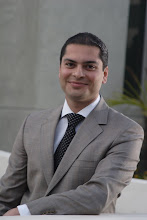In the previous post, I mentioned how GCC States have fueled their exponential growth with an immigrant labor force that is now demanding more compensation and is creating an imbalance in the labor markets where the private sector is less inclined to hire nationals.
One possible solution to the problem, is already being investigated and, in some cases, implemented in the region. The basic assumption is that by investing their huge oil wealth in other industries and by simultaneous investment in educating and training their younger generation, the GCC countries can create industries that can be competitive on a global scale and can be run by the skilled force of their nationals.
A bold initiative along these lines is the Masdar Institute of Science and Technology by the Government of Abu Dhabi. It involves substantial investments aimed at fostering clean technology ideas from research to commercialization. Projects like this are channels to divert the oil wealth to alternative industries in which the regional countries can emerge as global pioneers and leaders. If such high risk, high reward projects come to fruition we might see a future Gulf that is way more diversified than the one we know today. It can be more than just one of wealthiest areas in the world in terms of its petroleum income and act as a power center for development and deployment of intellectual capital and breakthrough technologies. Only time can show us what the outcome will be.
Subscribe to:
Post Comments (Atom)


No comments:
Post a Comment